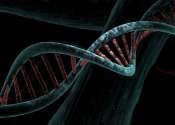Change in gene code may explain how human ancestors lost tails
A genetic change in our ancient ancestors may partly explain why humans don't have tails like monkeys, finds a new study led by researchers at NYU Grossman School of Medicine.

A genetic change in our ancient ancestors may partly explain why humans don't have tails like monkeys, finds a new study led by researchers at NYU Grossman School of Medicine.
Evolution
Feb 28, 2024
4
65

The recent approval of a CRISPR-Cas9 therapy for sickle cell disease demonstrates that gene editing tools can do a superb job of knocking out genes to cure hereditary disease. But it's still not possible to insert whole genes ...
Biotechnology
Feb 20, 2024
0
148

For decades, the Y chromosome—one of the two human sex chromosomes—has been notoriously challenging for the genomics community to sequence due to the complexity of its structure.
Molecular & Computational biology
Aug 23, 2023
1
1417

A team of researchers led by Feng Zhang at the Broad Institute of MIT and Harvard and the McGovern Institute for Brain Research at MIT has uncovered the first programmable RNA-guided system in eukaryotes—organisms that ...
Biotechnology
Jun 28, 2023
0
1696

Researchers at the Chinese Academy of Agricultural Sciences, China, have applied machine learning to genetic sequence data from wild and domestic European grapes.

A team of researchers in Carnegie Mellon University's Computational Biology Department (CBD) have developed new methods to identify parts of the genome critical to understanding how certain traits of species evolved.
Evolution
May 8, 2023
0
115

Over the past 100 million years, mammals have adapted to nearly every environment on Earth. Scientists with the Zoonomia Project have been cataloging the diversity in mammalian genomes by comparing DNA sequences from 240 ...
Evolution
Apr 27, 2023
0
581

The sled dog Balto has been celebrated in books and movies for his role in delivering desperately needed diphtheria antitoxin to Nome, Alaska, in 1925. Now, his DNA has enabled scientists to explore the genetics of 1920s ...
Evolution
Apr 27, 2023
0
3816

People infected with SARS-CoV-2, the virus that causes COVID-19, may experience genome structure changes that not only may explain our immunological symptoms after infection, but also potentially link to long COVID, according ...
Cell & Microbiology
Mar 23, 2023
0
182

A protein complex prevents the repair of genome damage in human cells, in mice and in the nematode Caenorhabditis elegans, a team of researchers at the University of Cologne has discovered. They also successfully inhibited ...
Cell & Microbiology
Mar 23, 2023
0
196
The human genome is the genome of Homo sapiens, which is stored on 23 chromosome pairs. Twenty-two of these are autosomal chromosome pairs, while the remaining pair is sex-determining. The haploid human genome occupies a total of just over 3 billion DNA base pairs. The Human Genome Project (HGP) produced a reference sequence of the euchromatic human genome, which is used worldwide in biomedical sciences.
The haploid human genome contains an estimated 20,000–25,000 protein-coding genes, far fewer than had been expected before its sequencing. In fact, only about 1.5% of the genome codes for proteins, while the rest consists of RNA genes, regulatory sequences, introns and (controversially) "junk" DNA.
This text uses material from Wikipedia, licensed under CC BY-SA